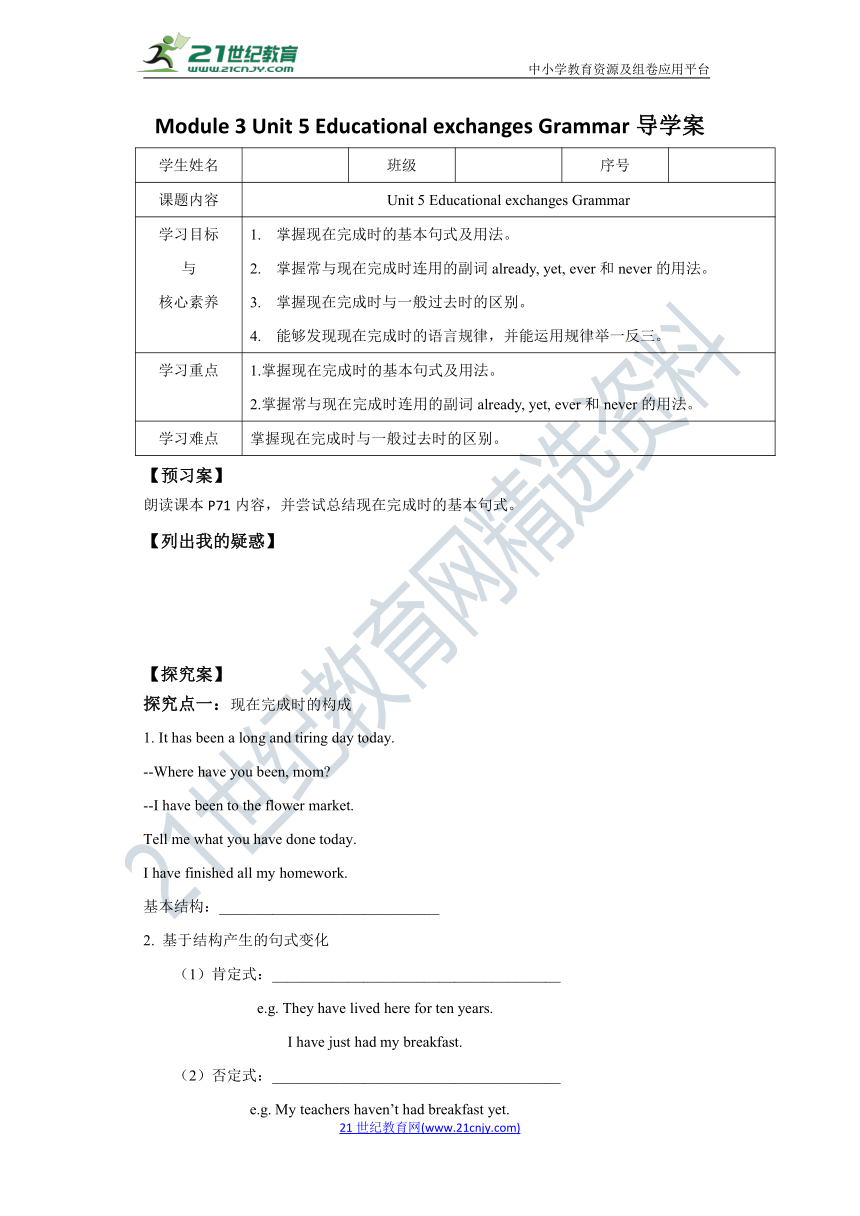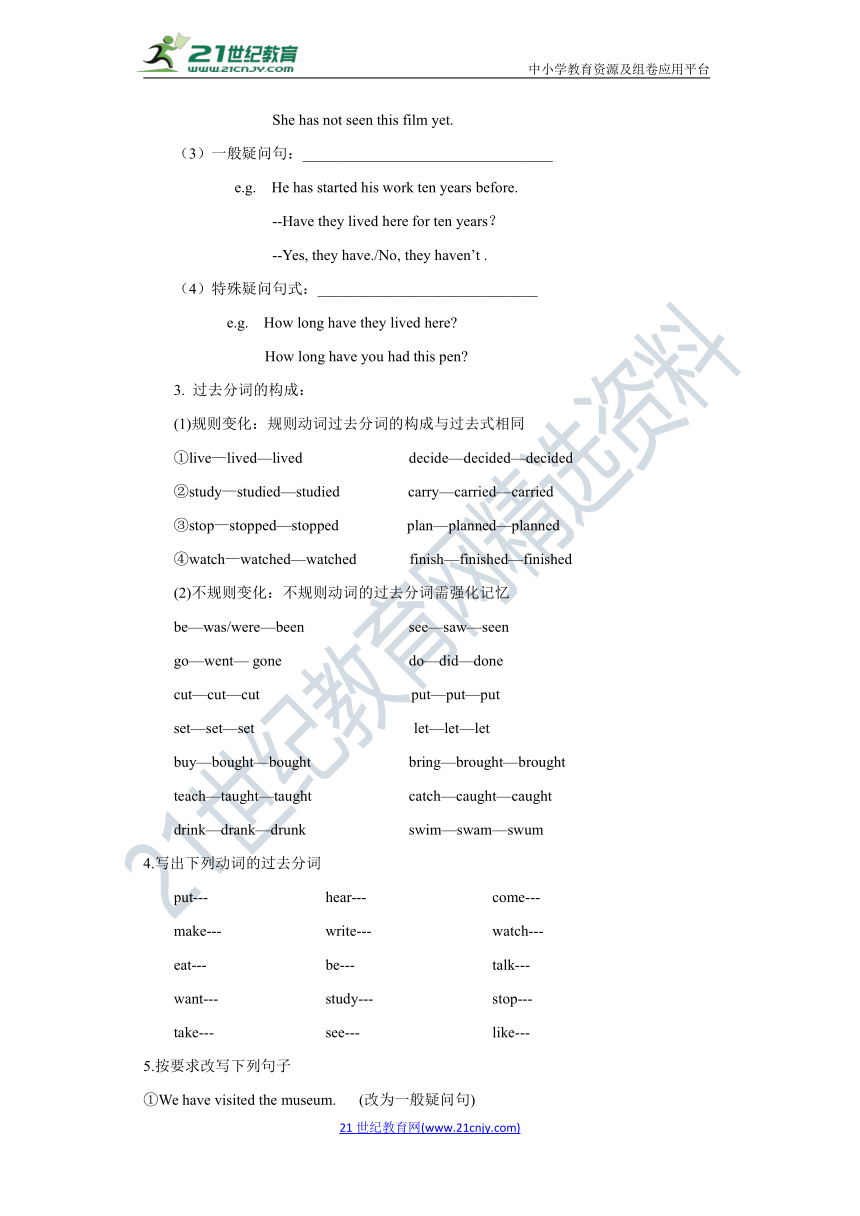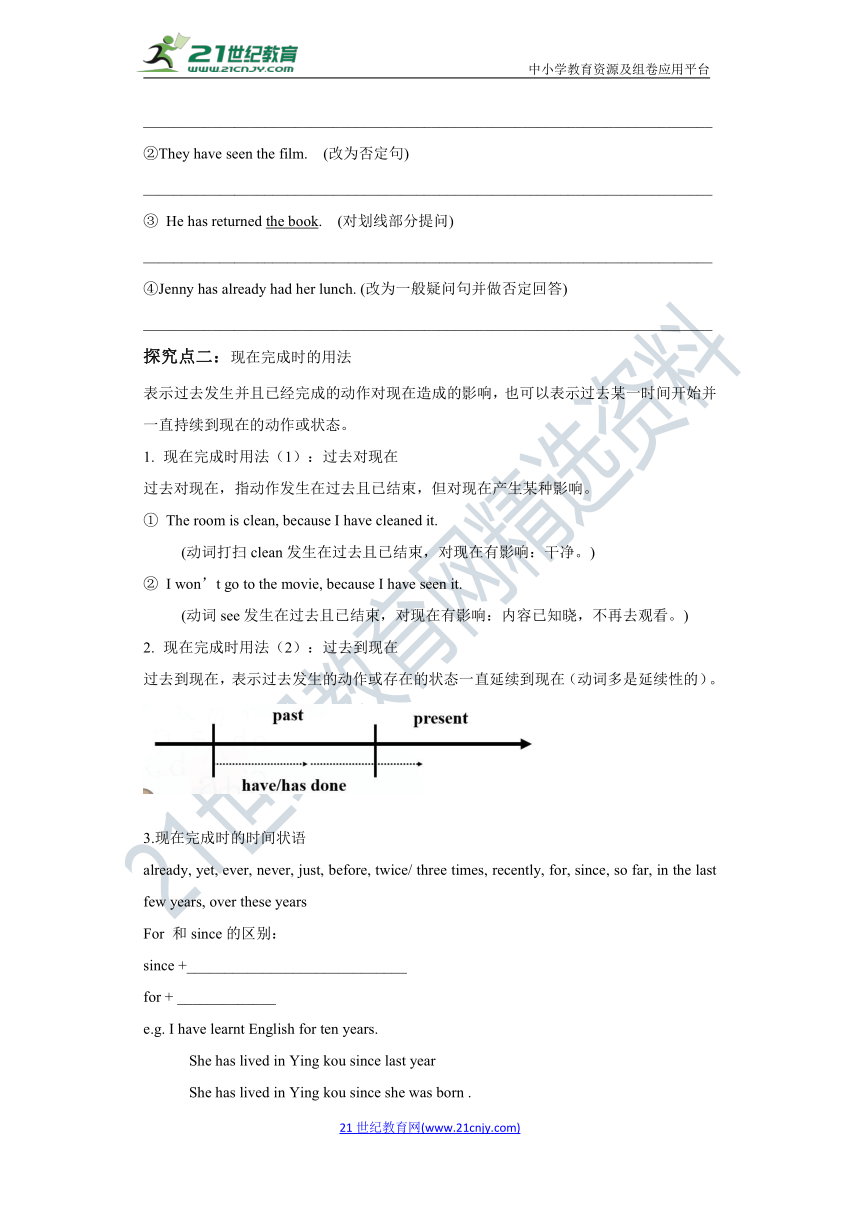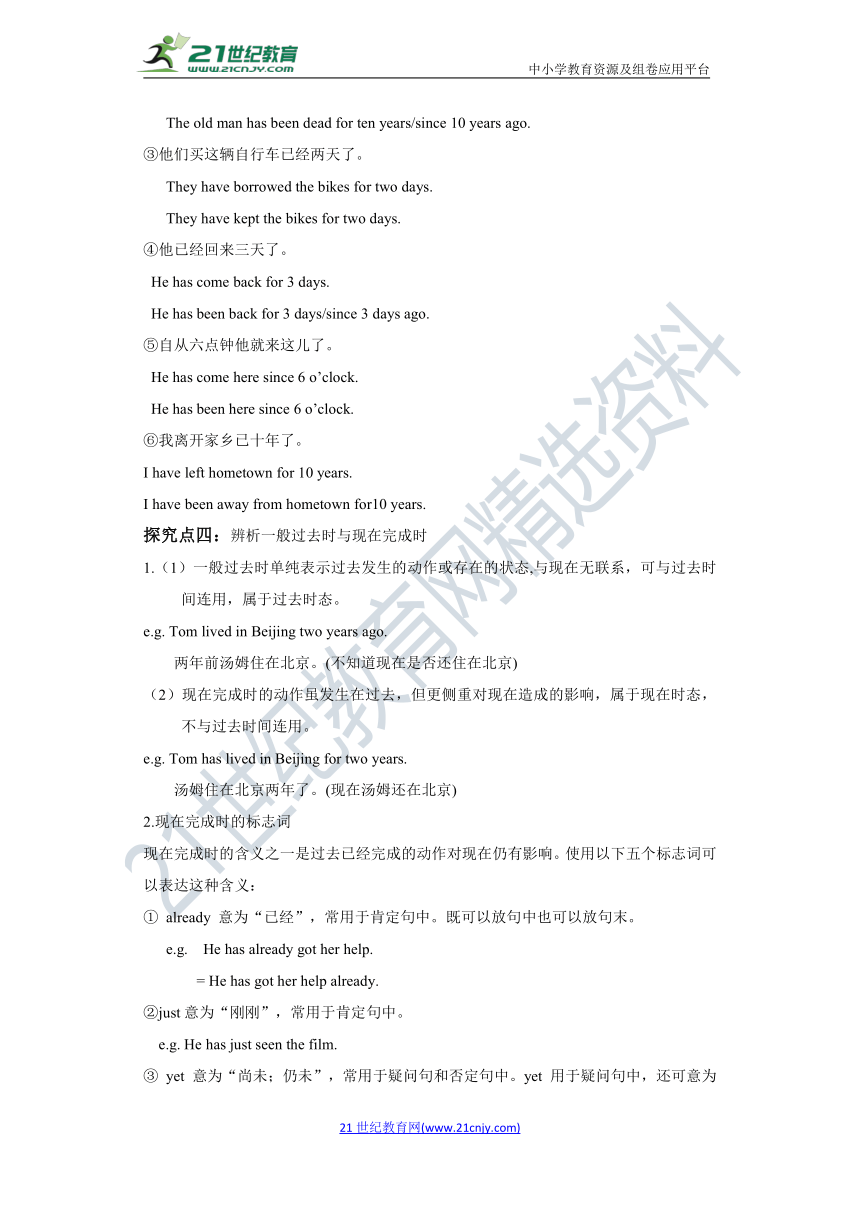Unit 5 Educational Exchanges 第3课时grammar导学案
文档属性
| 名称 | Unit 5 Educational Exchanges 第3课时grammar导学案 |

|
|
| 格式 | doc | ||
| 文件大小 | 2.7MB | ||
| 资源类型 | 试卷 | ||
| 版本资源 | 牛津深圳版 | ||
| 科目 | 英语 | ||
| 更新时间 | 2020-11-10 15:56:15 | ||
图片预览





文档简介
中小学教育资源及组卷应用平台
Module 3 Unit 5 Educational exchanges Grammar导学案
学生姓名
班级
序号
课题内容 Unit 5 Educational exchanges Grammar
学习目标 与
核心素养 掌握现在完成时的基本句式及用法。
掌握常与现在完成时连用的副词already, yet, ever和never的用法。
掌握现在完成时与一般过去时的区别。
能够发现现在完成时的语言规律,并能运用规律举一反三。
学习重点 1.掌握现在完成时的基本句式及用法。
2.掌握常与现在完成时连用的副词already, yet, ever和never的用法。
学习难点 掌握现在完成时与一般过去时的区别。
【预习案】
朗读课本P71内容,并尝试总结现在完成时的基本句式。
【列出我的疑惑】
【探究案】
探究点一:现在完成时的构成
1. It has been a long and tiring day today.
--Where have you been, mom?
--I have been to the flower market.
Tell me what you have done today.
I have finished all my homework.
基本结构:_____________________________
2. 基于结构产生的句式变化
(1)肯定式:______________________________________
e.g. They have lived here for ten years.
I have just had my breakfast.
(2)否定式:______________________________________
e.g. My teachers haven’t had breakfast yet.
She has not seen this film yet.
(3)一般疑问句:_________________________________
e.g. He has started his work ten years before.
--Have they lived here for ten years?
--Yes, they have./No, they haven’t .
(4)特殊疑问句式:_____________________________
e.g. How long have they lived here?
How long have you had this pen?
3. 过去分词的构成:
(1)规则变化:规则动词过去分词的构成与过去式相同
①live—lived—lived decide—decided—decided
②study—studied—studied carry—carried—carried
③stop—stopped—stopped plan—planned—planned
④watch—watched—watched finish—finished—finished
(2)不规则变化:不规则动词的过去分词需强化记忆
be—was/were—been see—saw—seen
go—went— gone do—did—done
cut—cut—cut put—put—put
set—set—set let—let—let
buy—bought—bought bring—brought—brought
teach—taught—taught catch—caught—caught
drink—drank—drunk swim—swam—swum
4.写出下列动词的过去分词
put--- hear--- come---
make--- write--- watch---
eat--- be--- talk---
want--- study--- stop---
take--- see--- like---
5.按要求改写下列句子
①We have visited the museum. (改为一般疑问句)
___________________________________________________________________________
②They have seen the film. (改为否定句)
___________________________________________________________________________
③ He has returned the book. (对划线部分提问)
___________________________________________________________________________
④Jenny has already had her lunch. (改为一般疑问句并做否定回答)
___________________________________________________________________________
探究点二:现在完成时的用法
表示过去发生并且已经完成的动作对现在造成的影响,也可以表示过去某一时间开始并一直持续到现在的动作或状态。
1. 现在完成时用法(1):过去对现在
过去对现在,指动作发生在过去且已结束,但对现在产生某种影响。
① The room is clean, because I have cleaned it.
(动词打扫clean发生在过去且已结束,对现在有影响:干净。)
② I won’t go to the movie, because I have seen it.
(动词see发生在过去且已结束,对现在有影响:内容已知晓,不再去观看。)
2. 现在完成时用法(2):过去到现在
过去到现在,表示过去发生的动作或存在的状态一直延续到现在(动词多是延续性的)。
3.现在完成时的时间状语
already, yet, ever, never, just, before, twice/ three times, recently, for, since, so far, in the last few years, over these years
For 和since的区别:
since +_____________________________
for + _____________
e.g. I have learnt English for ten years.
She has lived in Ying kou since last year
She has lived in Ying kou since she was born .
4.选用 for和 since填空。
①We haven’t seen each other ______ a long time.
②His father has been in the Party ______ 10 years ago.
③The film has been on ______ 20 minutes.
④Mr Green has worked here ______ he came to China.
⑤His grandparents have been dead ______ several years.
⑥It’s five years _______ we met last time.
探究点三:动词转化
行为动词根据其能否持续可分为非延续动词(短暂/瞬间动词)和延续动词。现在完成时中表示短暂动作的动词不能与for, since等引导的时间状语连用。如与一段时间连用,要把瞬间动词转化为意思相近的延续性动词。
1.常见的变化
非延续性动词 延续性动词
borrow keep
buy have
die be dead
leave be away (from)
begin/start be on
marry be married
come/go be here/there
finish be over
open be open
close be closed
become be
join be in…/be a member of
2.判断正误
①我买了这块手表五年了。
I have bought this watch for five years.
I have had this watch for five years.
②这位老人已经死了十年了。
The old man has died for ten years.
The old man has been dead for ten years/since 10 years ago.
③他们买这辆自行车已经两天了。
They have borrowed the bikes for two days.
They have kept the bikes for two days.
④他已经回来三天了。
He has come back for 3 days.
He has been back for 3 days/since 3 days ago.
⑤自从六点钟他就来这儿了。
He has come here since 6 o’clock.
He has been here since 6 o’clock.
⑥我离开家乡已十年了。
I have left hometown for 10 years.
I have been away from hometown for10 years.
探究点四:辨析一般过去时与现在完成时
1.(1)一般过去时单纯表示过去发生的动作或存在的状态,与现在无联系,可与过去时间连用,属于过去时态。
e.g. Tom lived in Beijing two years ago.
两年前汤姆住在北京。(不知道现在是否还住在北京)
(2)现在完成时的动作虽发生在过去,但更侧重对现在造成的影响,属于现在时态,不与过去时间连用。
e.g. Tom has lived in Beijing for two years.
汤姆住在北京两年了。(现在汤姆还在北京)
2.现在完成时的标志词
现在完成时的含义之一是过去已经完成的动作对现在仍有影响。使用以下五个标志词可以表达这种含义:
① already 意为“已经”,常用于肯定句中。既可以放句中也可以放句末。
e.g. He has already got her help.
= He has got her help already.
②just意为“刚刚”,常用于肯定句中。
e.g. He has just seen the film.
③ yet 意为“尚未;仍未”,常用于疑问句和否定句中。yet 用于疑问句中,还可意为“已经;还”,通常放在句末。
e.g. — Has Tom come back yet?
— No, he hasn’t come back yet.
④ever 意为“曾经”,常用于肯定句和疑问句中。
e.g. This is the best film I have ever seen.
Have you ever been to Hong Kong?
⑤never 意为“从来没有”,表示否定,其句中不能再用其他否定词。
e.g. He has never been to Beijing.
3.填空。
①_____ you ________(clean) the room?
Yes, we __________ (do) that already.
When _______ you ______(do) it?
We _______(do) it an hour ago.
②______ he ______(see) this film yet? Yes.
When _____ he _____(see) it?
He ______ it last week.
③How many times _____ you______(be) there?
探究点五:常见句式
1.have been to “到过,去过”,表示曾经到过某处,但现在人不在那儿。
e.g. I have been to the USA twice.
have gone to “去了”,表示已经去了某地,现在人可能在去的途中或已在那儿了。
e.g. —Where is Jim? —He has gone to the library. 。
have been in“来某处一段时间了”与for,since,how long连用
e.g. We have been in this city for three years.
2.选择
① Jane has _____ to BeiJing. She will come back tomorrow.
A. been B. never been C. went D. gone
② -- Hello, this is Mr. Green speaking. Can I speak to Mr. Black?
-- Sorry. He ______ the Bainiao Park.
A. has been to B. has gone to C. went to D. will go to
③ --____ you ever ____ to the US?
-- Yes, twice.
A. Have, gone B. Have, been C, Do, go D. were, going
④ He _______Beijing for 2 months.
A.has been to B. has gone to C. has been in D. has come to
3.完成课本P72,73练习。
【我的知识网络图】
【训练案】
Ⅰ.单项选择。
1. Wow! You _________ dinner! Let’s eat now.
A. cook B. are cooking C. will cook D. have cooked
2. Betty _________ hard since last term. That's why her exam results are so good!
A. has worked B. will work C. worked D. was working
3. In the past few years there _________ great changes in my hometown.
A. had been B. have been C. were D. are
4. --- Where's your brother?
--- Oh, he _________ the library and _________.
A. has been to; so Lucy 1 B. has gone to; so Lucy has
C. has gone to; so has Lucy D. has been in; so has Lucy
5. I am surprised at the new look of my hometown, for it _________ a lot over the years.
A. changed B. changes C. will change D. has changed
Ⅱ.用括号中所给单词的适当形式填空
6. Mr and Mrs Li _________ (not come) back yet.
7. My brother _________ (be) born in 1983. Since then, he _________ (live) in this city.
8. I _________ (not hear) from my brother for several months.
9. Don't worry. The train has just _________ (arrive).
10. They _________ already _________ (decide) to go to Japan for the holiday.
Ⅲ.完形填空
Charles Dickens, one of the greatest English writers, was born in 11 of the small towns in England.
When Dickens was nine years old, the family moved to London, the 12 of England. There were several younger children in the 13 . Their life was 14 . So Dickens could not go to school.
He didn't go to 15 until his father came out of prison. At that time he was already twelve years old. But he did not finish school. Two years 16 he began to work. He often went to the library to 17 books. He read a lot. Then Dickens wrote lots of novels and stories all his 18 . Dickens 19 over a hundred years ago. 20 people are still reading his books with great interest.
11. A. any B. one C. some
12. A. city B. town C. capital
13. A. school B. class C. family
14. A. good B. hard C. easy
15. A. school B. the school C. work
16. A. ago B. before C. later
17. A. look B. read C. see
18. A. money B. home C. life
19. A. won B. died C. read
20. A. But B. So C. Why
Ⅳ.阅读理解
Susan was a quiet girl and she had few friends. She was a bit nervous when she went to high school, because she was going to live with someone she didn't know in a town 300 miles away from home. She had no idea how to make friends in the new environment.
However, things were not bad in Susan's high school life. In her first English class, the teacher asked all the students to talk about themselves. And the final question for each student was “What is your goal(目标) in this class?”. Most of the students said it was to get good grades, pass the exams or something like that, but Susan said that her goal was to make just one good friend. It was quite different.
When most of the students sat quietly, one student came to Susan. He held out(伸出)his hand and introduced himself. He asked if she would be his friend, All of the students looked at Susan. She smiled and took his hand. Later. The boy became Susan's best friend.
That day, Susan learned the power of asking for what she wanted. being honest and taking action.
21. Susan felt a little _________ when she went to high school.
A. nervous B. excited C. happy D. sad
22. How far was it from her school to her home?
A. 30 miles. B. 300 miles. C. 30 metres. D. 300 metres.
23. In the first English class, what did the teacher ask the students to do?
A. Make friends. B. Take an exam.
C. Talk about themselves. D. Read books
24. What did Susan want to do in that English class?
A. Get good grades. B. Pass the exams.
C. Make just one good friend. D. Make a lot of friends.
25. Which of the following is TRUE?
A. Susan had many friends before she went to high school.
B. Susan had a plan to make more friends in high school.
C. Susan didn’t make a new friend in that class.
D. Susan learned the power of asking for what she wanted in that class.
【教与学的反思】
探究案答案:
探究点一:
1.
2.
4.
5.
探究点二:
3.
4.
探究点三:
探究点四:
探究点五:
2.DBBC
3.
训练案答案:
Ⅰ.1-5 DABCD
Ⅱ. 6. haven’t come
7. was, has lived
8. haven’t heard
9. arrived
10. have, decided
Ⅲ. 11-15 BCCBA 16-20 CBCBA
Ⅳ. 21-25 ABCCD
_21?????????è?????(www.21cnjy.com)_
Module 3 Unit 5 Educational exchanges Grammar导学案
学生姓名
班级
序号
课题内容 Unit 5 Educational exchanges Grammar
学习目标 与
核心素养 掌握现在完成时的基本句式及用法。
掌握常与现在完成时连用的副词already, yet, ever和never的用法。
掌握现在完成时与一般过去时的区别。
能够发现现在完成时的语言规律,并能运用规律举一反三。
学习重点 1.掌握现在完成时的基本句式及用法。
2.掌握常与现在完成时连用的副词already, yet, ever和never的用法。
学习难点 掌握现在完成时与一般过去时的区别。
【预习案】
朗读课本P71内容,并尝试总结现在完成时的基本句式。
【列出我的疑惑】
【探究案】
探究点一:现在完成时的构成
1. It has been a long and tiring day today.
--Where have you been, mom?
--I have been to the flower market.
Tell me what you have done today.
I have finished all my homework.
基本结构:_____________________________
2. 基于结构产生的句式变化
(1)肯定式:______________________________________
e.g. They have lived here for ten years.
I have just had my breakfast.
(2)否定式:______________________________________
e.g. My teachers haven’t had breakfast yet.
She has not seen this film yet.
(3)一般疑问句:_________________________________
e.g. He has started his work ten years before.
--Have they lived here for ten years?
--Yes, they have./No, they haven’t .
(4)特殊疑问句式:_____________________________
e.g. How long have they lived here?
How long have you had this pen?
3. 过去分词的构成:
(1)规则变化:规则动词过去分词的构成与过去式相同
①live—lived—lived decide—decided—decided
②study—studied—studied carry—carried—carried
③stop—stopped—stopped plan—planned—planned
④watch—watched—watched finish—finished—finished
(2)不规则变化:不规则动词的过去分词需强化记忆
be—was/were—been see—saw—seen
go—went— gone do—did—done
cut—cut—cut put—put—put
set—set—set let—let—let
buy—bought—bought bring—brought—brought
teach—taught—taught catch—caught—caught
drink—drank—drunk swim—swam—swum
4.写出下列动词的过去分词
put--- hear--- come---
make--- write--- watch---
eat--- be--- talk---
want--- study--- stop---
take--- see--- like---
5.按要求改写下列句子
①We have visited the museum. (改为一般疑问句)
___________________________________________________________________________
②They have seen the film. (改为否定句)
___________________________________________________________________________
③ He has returned the book. (对划线部分提问)
___________________________________________________________________________
④Jenny has already had her lunch. (改为一般疑问句并做否定回答)
___________________________________________________________________________
探究点二:现在完成时的用法
表示过去发生并且已经完成的动作对现在造成的影响,也可以表示过去某一时间开始并一直持续到现在的动作或状态。
1. 现在完成时用法(1):过去对现在
过去对现在,指动作发生在过去且已结束,但对现在产生某种影响。
① The room is clean, because I have cleaned it.
(动词打扫clean发生在过去且已结束,对现在有影响:干净。)
② I won’t go to the movie, because I have seen it.
(动词see发生在过去且已结束,对现在有影响:内容已知晓,不再去观看。)
2. 现在完成时用法(2):过去到现在
过去到现在,表示过去发生的动作或存在的状态一直延续到现在(动词多是延续性的)。
3.现在完成时的时间状语
already, yet, ever, never, just, before, twice/ three times, recently, for, since, so far, in the last few years, over these years
For 和since的区别:
since +_____________________________
for + _____________
e.g. I have learnt English for ten years.
She has lived in Ying kou since last year
She has lived in Ying kou since she was born .
4.选用 for和 since填空。
①We haven’t seen each other ______ a long time.
②His father has been in the Party ______ 10 years ago.
③The film has been on ______ 20 minutes.
④Mr Green has worked here ______ he came to China.
⑤His grandparents have been dead ______ several years.
⑥It’s five years _______ we met last time.
探究点三:动词转化
行为动词根据其能否持续可分为非延续动词(短暂/瞬间动词)和延续动词。现在完成时中表示短暂动作的动词不能与for, since等引导的时间状语连用。如与一段时间连用,要把瞬间动词转化为意思相近的延续性动词。
1.常见的变化
非延续性动词 延续性动词
borrow keep
buy have
die be dead
leave be away (from)
begin/start be on
marry be married
come/go be here/there
finish be over
open be open
close be closed
become be
join be in…/be a member of
2.判断正误
①我买了这块手表五年了。
I have bought this watch for five years.
I have had this watch for five years.
②这位老人已经死了十年了。
The old man has died for ten years.
The old man has been dead for ten years/since 10 years ago.
③他们买这辆自行车已经两天了。
They have borrowed the bikes for two days.
They have kept the bikes for two days.
④他已经回来三天了。
He has come back for 3 days.
He has been back for 3 days/since 3 days ago.
⑤自从六点钟他就来这儿了。
He has come here since 6 o’clock.
He has been here since 6 o’clock.
⑥我离开家乡已十年了。
I have left hometown for 10 years.
I have been away from hometown for10 years.
探究点四:辨析一般过去时与现在完成时
1.(1)一般过去时单纯表示过去发生的动作或存在的状态,与现在无联系,可与过去时间连用,属于过去时态。
e.g. Tom lived in Beijing two years ago.
两年前汤姆住在北京。(不知道现在是否还住在北京)
(2)现在完成时的动作虽发生在过去,但更侧重对现在造成的影响,属于现在时态,不与过去时间连用。
e.g. Tom has lived in Beijing for two years.
汤姆住在北京两年了。(现在汤姆还在北京)
2.现在完成时的标志词
现在完成时的含义之一是过去已经完成的动作对现在仍有影响。使用以下五个标志词可以表达这种含义:
① already 意为“已经”,常用于肯定句中。既可以放句中也可以放句末。
e.g. He has already got her help.
= He has got her help already.
②just意为“刚刚”,常用于肯定句中。
e.g. He has just seen the film.
③ yet 意为“尚未;仍未”,常用于疑问句和否定句中。yet 用于疑问句中,还可意为“已经;还”,通常放在句末。
e.g. — Has Tom come back yet?
— No, he hasn’t come back yet.
④ever 意为“曾经”,常用于肯定句和疑问句中。
e.g. This is the best film I have ever seen.
Have you ever been to Hong Kong?
⑤never 意为“从来没有”,表示否定,其句中不能再用其他否定词。
e.g. He has never been to Beijing.
3.填空。
①_____ you ________(clean) the room?
Yes, we __________ (do) that already.
When _______ you ______(do) it?
We _______(do) it an hour ago.
②______ he ______(see) this film yet? Yes.
When _____ he _____(see) it?
He ______ it last week.
③How many times _____ you______(be) there?
探究点五:常见句式
1.have been to “到过,去过”,表示曾经到过某处,但现在人不在那儿。
e.g. I have been to the USA twice.
have gone to “去了”,表示已经去了某地,现在人可能在去的途中或已在那儿了。
e.g. —Where is Jim? —He has gone to the library. 。
have been in“来某处一段时间了”与for,since,how long连用
e.g. We have been in this city for three years.
2.选择
① Jane has _____ to BeiJing. She will come back tomorrow.
A. been B. never been C. went D. gone
② -- Hello, this is Mr. Green speaking. Can I speak to Mr. Black?
-- Sorry. He ______ the Bainiao Park.
A. has been to B. has gone to C. went to D. will go to
③ --____ you ever ____ to the US?
-- Yes, twice.
A. Have, gone B. Have, been C, Do, go D. were, going
④ He _______Beijing for 2 months.
A.has been to B. has gone to C. has been in D. has come to
3.完成课本P72,73练习。
【我的知识网络图】
【训练案】
Ⅰ.单项选择。
1. Wow! You _________ dinner! Let’s eat now.
A. cook B. are cooking C. will cook D. have cooked
2. Betty _________ hard since last term. That's why her exam results are so good!
A. has worked B. will work C. worked D. was working
3. In the past few years there _________ great changes in my hometown.
A. had been B. have been C. were D. are
4. --- Where's your brother?
--- Oh, he _________ the library and _________.
A. has been to; so Lucy 1 B. has gone to; so Lucy has
C. has gone to; so has Lucy D. has been in; so has Lucy
5. I am surprised at the new look of my hometown, for it _________ a lot over the years.
A. changed B. changes C. will change D. has changed
Ⅱ.用括号中所给单词的适当形式填空
6. Mr and Mrs Li _________ (not come) back yet.
7. My brother _________ (be) born in 1983. Since then, he _________ (live) in this city.
8. I _________ (not hear) from my brother for several months.
9. Don't worry. The train has just _________ (arrive).
10. They _________ already _________ (decide) to go to Japan for the holiday.
Ⅲ.完形填空
Charles Dickens, one of the greatest English writers, was born in 11 of the small towns in England.
When Dickens was nine years old, the family moved to London, the 12 of England. There were several younger children in the 13 . Their life was 14 . So Dickens could not go to school.
He didn't go to 15 until his father came out of prison. At that time he was already twelve years old. But he did not finish school. Two years 16 he began to work. He often went to the library to 17 books. He read a lot. Then Dickens wrote lots of novels and stories all his 18 . Dickens 19 over a hundred years ago. 20 people are still reading his books with great interest.
11. A. any B. one C. some
12. A. city B. town C. capital
13. A. school B. class C. family
14. A. good B. hard C. easy
15. A. school B. the school C. work
16. A. ago B. before C. later
17. A. look B. read C. see
18. A. money B. home C. life
19. A. won B. died C. read
20. A. But B. So C. Why
Ⅳ.阅读理解
Susan was a quiet girl and she had few friends. She was a bit nervous when she went to high school, because she was going to live with someone she didn't know in a town 300 miles away from home. She had no idea how to make friends in the new environment.
However, things were not bad in Susan's high school life. In her first English class, the teacher asked all the students to talk about themselves. And the final question for each student was “What is your goal(目标) in this class?”. Most of the students said it was to get good grades, pass the exams or something like that, but Susan said that her goal was to make just one good friend. It was quite different.
When most of the students sat quietly, one student came to Susan. He held out(伸出)his hand and introduced himself. He asked if she would be his friend, All of the students looked at Susan. She smiled and took his hand. Later. The boy became Susan's best friend.
That day, Susan learned the power of asking for what she wanted. being honest and taking action.
21. Susan felt a little _________ when she went to high school.
A. nervous B. excited C. happy D. sad
22. How far was it from her school to her home?
A. 30 miles. B. 300 miles. C. 30 metres. D. 300 metres.
23. In the first English class, what did the teacher ask the students to do?
A. Make friends. B. Take an exam.
C. Talk about themselves. D. Read books
24. What did Susan want to do in that English class?
A. Get good grades. B. Pass the exams.
C. Make just one good friend. D. Make a lot of friends.
25. Which of the following is TRUE?
A. Susan had many friends before she went to high school.
B. Susan had a plan to make more friends in high school.
C. Susan didn’t make a new friend in that class.
D. Susan learned the power of asking for what she wanted in that class.
【教与学的反思】
探究案答案:
探究点一:
1.
2.
4.
5.
探究点二:
3.
4.
探究点三:
探究点四:
探究点五:
2.DBBC
3.
训练案答案:
Ⅰ.1-5 DABCD
Ⅱ. 6. haven’t come
7. was, has lived
8. haven’t heard
9. arrived
10. have, decided
Ⅲ. 11-15 BCCBA 16-20 CBCBA
Ⅳ. 21-25 ABCCD
_21?????????è?????(www.21cnjy.com)_
